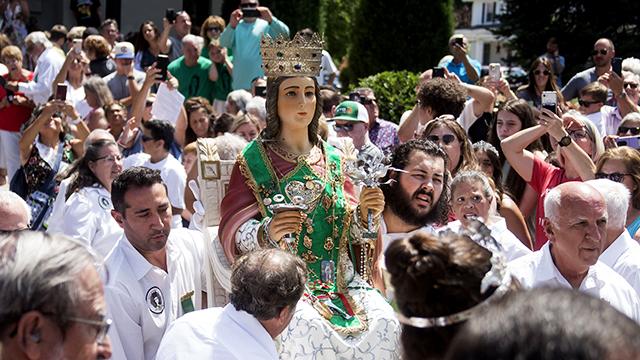Dear Friends,
This weekend our parish joins with the Santa Lucia Festival Committee in celebrating a 99-year tradition in the Sicilian community in Omaha. The Festival is once again on our doorstep which makes it so much easier to participate in the fun and the music. I hope you get a chance to engage in the festivities.
The Omaha Italian community brought the Santa Lucia tradition with them from Carlentini, Italy, where her tradition has been going on for centuries. One of the struggles in celebrating her life as a Christian is that so little of her history survived the ravages of time. If you go and search for her history, you will find that the older books will have a lengthy paragraph detailing a small number of traditions. Newer books will have a lengthy paragraph showing that there is little basis in history for these traditions. The single fact survives that a disappointed suitor accused Lucy of being a Christian, and she was executed in Syracuse, Sicily, in the year 304. But it is also true that her name is mentioned in the First Eucharistic Prayer, she is the patron saint of those with vision problems, geographical places are named after her, and down through the centuries many little girls have been proud to bear the name Lucy.
It is possible to imagine what a young Christian woman had to contend with in pagan Sicily in the year 300. If you have trouble imagining, just look around at today’s pleasure-at-all-costs world and the barriers it presents against leading a good Christian life. Our world has become much like the ancient world where the people were not aware of Jesus and his way of living.
Lucy’s friends must have wondered aloud about this Jesus that she talked about, an obscure preacher in a far-off nation, that had been destroyed more than 200 years before. He had grown up a tekton, a construction worker, and after a short life of preaching was crucified by the Romans after his own people turned him over. Lucy believed with her whole heart that this preacher had risen from the dead. To give witness to her faith, she made a commitment to live her life for God by foregoing family and living a life of virginity. Legend has it that St. Lucy delivered wheat and bread to the poor and homebound, and possibly to Christians staying in the catacombs, often in the darkness of night to avoid detection. She would carry a lamp or wear a crown of candles (to free her hands for carrying food) to light her way.
What would you say to a young woman who would make that decision today? What would we say to any young person who decides to give up the race for money and prestige to live a life in service to the gospel? Even fellow Christians may think them a bit crazy but non-Christians must have thought Lucy needed a mental hospital. Maybe the kindlier ones just thought her a little strange. To be pure before marriage was an ancient Roman ideal, rarely found, but not to be condemned. To exclude marriage altogether, however, was too much. What was she hiding?
Lucy knew of the stories, the heroism of early women martyrs. When it came her time to live a life of faith and courage, she remained faithful to their example and to the example of Jesus, whom she knew to be the Son of God. The image of St. Lucy at our parish shows her seated, enthroned, and proudly displaying the punishment she endured for choosing to follow Jesus. We may not know much about her but we do know, in the moment that mattered, she made a radical choice to die rather than give up her belief in Jesus.
A recent article in The Atlantic discusses the issue of why a good number of people have not returned to church after Covid. The author points out that too many churches have simply become feel good social clubs that demand nothing of their members. It is easy not to return to church if all they are is one more group that makes you feel okay. The churches that seem to be doing better are the ones that help their members realize that they have to change their life if they are going to be disciples of Jesus. If you live and act like your atheistic neighbors, then what does Christianity mean to you? As Jake Meader, the author of the article, says, “Churches could model better, truer sorts of communities, ones in which the hungry are fed, the weak are lifted up, and the proud are cast down. Such communities might not have the money, success, and influence that many American churches have so often pursued in recent years. But if such communities look less like those churches, they might also look more like the sorts of communities Jesus expected his followers to create.”
Let St. Lucy inspire you to make a choice to truly follow Jesus, to live a heroic life of discipleship, to remain close to the Church Jesus started, and to encounter God by doing so.
Peace,
Fr. Damian
For a longer version of Lucy’s story:



